The Stores Across from the Train Depot
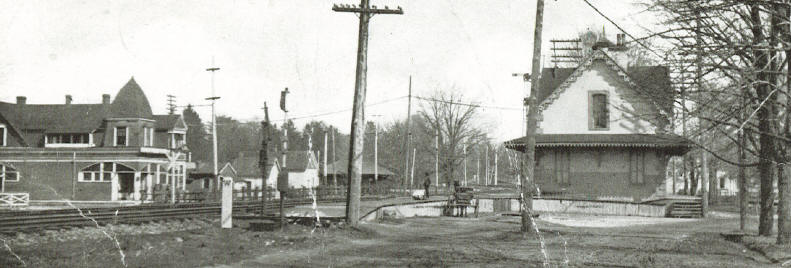
A pre-1912 view of downtown Pewee Valley, including the railroad depot (right)
and Jurey & Harbourt’s original Queen Ann-style store (left).
(from an old post card of the era)
When Anne Fellows Johnston first visited Pewee Valley in 1895, H.M.Woodruff’s General Store was already open for business at what is now 220 Mt. Mercy Drive. In 1889, a second general store opened across the street. Destroyed by fire in 1912, W.N Jurey’s original Queen Anne store was replaced by the building that is now the Little Colonel Playhouse. Jurey’s store appears in the Little Colonel at Boarding-School, when Lloyd’s classmate, Ida Shane, sets up a secret rendezvous with her illicit fiancé Ned Bannon. Johnston based the cautionary tale on the real-life elopement of W.N.’s son Albert with a student at the Kentucky College.
In “The Little Colonel at Boarding-School,” the store across from the railroad depot is the setting for Ida Shane’s first rendezvous with her illicit lover and secret fiancé, “Edwardo,” after her aunt sends her to Lloydsboro Seminary in an effort to break up the affair. The store is also where the Little Colonel first learns “Edwardo’s” true identity – he is none other than the notorious Ned Bannon, about whom she has been warned by her father, Papa Jack!
From Chapter XI, “A Wolf in Sheep’s Clothing:
EVERY day since the first of November there had been a letter for Ida in the Sherman’s post-office box, under cover of Lloyd’s address. Lloyd had grown to dread the afternoon walks with the school, for she was in a flutter of nervousness from the moment they came in sight of the post-office until the letter was safe in Ida’s possession. There was always the fear that Betty might get to the window first, or that she might catch sight of the envelope, addressed with many flourishes in a big, bold hand; or that that letter might be the only one, as it often was, and Betty might wonder why Lloyd’s face should grow so red when she answered, “No, nothing for us this time.”
It was easier to manage after the weather turned cold enough to furnish an excuse for carrying a muff, but even then she fancied that Miss Mattie looked at her curiously sometimes, when she thrust the daily letter hastily out of sight without a second glance. She never went through the performance without wishing that it might be the last time that she should be placed in such an uncomfortable position; but afterward she always reproached herself for making such a wish. It seemed a very poor friendship that could not stand a little test like that. It was such a small thing to do when the happiness of her friend’s whole life was at stake…
…One afternoon, near the middle of November, Lloyd, hurrying through the lower hall with an open letter in her hand, met the president.
“Oh, Doctah Wells!” she exclaimed. “I was just going to yoah room. Heah is a note mothah sent you in the lettah that came to-day. She has written for some things she needs, and wants Betty and me to walk up to Locust aftah school with a message to the servants about packing them, if you’ll excuse us from the regulah promenade.”
“Certainly,” he answered, glancing over Mrs. Sherman’s gracefully written request.
“But Betty has such a bad cold,” continued Lloyd, ” that the matron thinks she oughtn’t to go out to walk today, and it’s lonely going back home by myself, when it’s all shut up. May I take Ida Shane with me instead? She’s nevah seen Locust from the inside, and I’d love to show it to her. You know,” a little smile dimpling her face as she spoke, “I can’t help being proud of the old place”
“You have good reason,” said the professor, smiling back at her kindly.” It is certainly a beautiful old homestead. Yes, I have no objection to Ida’s going with you.”
“Oh, thank you!” cried Lloyd. She hurried up the stairs to Ida’s room, calling excitedly as she reached the door, “Yes, he says you may go. Hurry and put on your things so that we can have as long time as possible up there.”
Betty had gone into the matron’s room in her absence. It took Lloyd only a moment to slip into her hat and coat. Then catching up her muff and thrusting it under her arm, she started back to Ida’s room, buttoning her gloves as she went. Ida had taken down her hair and was deliberately rearranging it before the mirror.
“Oh, what did you do that for?” cried Lloyd, half-impatiently. “It looked all right as it was. We’re not going to see any one but the servants. There’s no use wearing your best hat.” She glanced at the mass of velvet and plumes lying on the bed. “Just pin your hair up any fashion and stick on your mortarboard. That’ll do.”
“Shut the door, please,” said Ida, in a low tone. “I have something to tell you.” She bent nearer the mirror, drawing the comb through the fluffy pompadour. “We are going to see some one this afternoon. Edwardo is in the Valley.”
Lloyd dropped her muff at this surprising announcement, but Ida went on, calmly. “I’ve been expecting him for several days. He comes to Lloydsboro sometimes to visit his cousin. I’ve lain awake nights trying to arrange some way to see him. This is a thousand times better than any way I could think of. I’m the luckiest girl that ever lived to have such a friend as you to plan for me, Princess”
“I don’t know what you mean,” exclaimed Lloyd. “I haven’t planned anything.”
“No, not intentionally, but look how easy you have made it for me to have an interview. He’ll be on the watch for the seminary girls to pass by the store, for I was to manage to leave a note there for him, telling him where I can see him. All I have to do now is to signal him to follow, and we can have a good long talk at Locust while you are giving the servants their orders. You don’t mind, do you?” she asked, as Lloyd continued to stare at her without saying anything.
“No. Oh, no! Of co’se not,” answered Lloyd, with a confused laugh. “Only it makes me feel so que’ah to think that I’m really going to see him. It’s just as if Lord Rokeby or the squire’s son had stepped out of the book. I feel as if I were in a book myself since you told me that. This is the way it would be on the page, if we could stand off and read about ourselves: ‘And Violet’s little friend led the way down the long avenue, and there on the threshold of her home, after months of cruel separation, the reunited lovers kept their tryst.’”
Ida laughed happily. “You’ll have a book written before Betty is half-started if you go on at that rate. Now tell me. Do I look all right?”
She was settling the big picture-hat in place over her soft hair as she anxiously asked the question. Lloyd regarded her critically, tipping her head a trifle to one side as she looked.
“Put your hat a hairbreadth farther over your face,” she exclaimed. “There! That’s lovely. Oh, Violet, that shade of velvet is so becoming to you. It’s just the colah of yoah eyes. I nevah saw you look so beautiful.”
A becoming pink flushed Ida’s cheeks. She bent her head over the bunch of violets pinned on the lapel of her coat. “It’s dear of you to think so,” she said, “and it’s dear of you to send me these violets every week. These are unusually sweet. I’m so glad I have afresh bunch for today — this happy day.”
Lloyd took the keenest delight in watching the graceful girl sweep down the hall ahead of her. From the plumes of the picture-hat to the hem of her stylish gown she thoroughly satisfied Lloyd’s artistic instinct for the beautiful. She gave her arm an adoring little squeeze as they passed down the stairs together.
Out on the road she glanced up at Ida again. Happiness had not made her radiant, as it did Daisy Dale, but there was a soft light in the violet eyes which made Lloyd think of a picture she had seen of a vestal maiden on her way to guard the holy altar fires.
Lloyd’s heart began to beat faster as she realized that every step was taking them nearer to Edwardo. She pictured him again in her imagination, as she had done so many times before. She would know that pale, serious face with its flashing eyes anywhere she might meet him, she was sure.
Neither of them spoke as they hurried along the path through the lower part of Clovercroft and pushed open the woodland gate. But as they stepped up on the platform in front of the depot, Lloyd said, “Let’s cross the track heah, and go up on the othah side of the road. Then we’ll not have to pass the waiting-rooms. There’s always so many people loafing around the window of the telegraph-office.”
Instinctively she felt that while a little girl like herself would attract no attention, Ida in her long sweeping dress that she held up so gracefully, and the big hat drooping over her pretty face, and the stylish fur collar, and the violets on her coat, made a picture that any one would turn to look at twice. She could not bear to think of the bold glances that might be cast after her by the loafers around the depot. It seemed to her little short of sacrilege, although she could not have put the feeling into words, for any eyes but Edwardo’s to rest upon her as she went on her way to this meeting with that vestal-maiden look upon her face.
“Very well,” assented Ida. “You know we want to stop at the store. I want to get some chocolate creams if they have any fresh ones.”
Lloyd’s heart gave a frightened thump as she remembered that it was in the store that Edwardo would be watching presently for the seminary girls to go by. It was half an hour earlier than they usually passed, but there was a possibility that he might be there. In less than a minute she might be face to face with the live hero of a real romance. It was with an odd feeling of mingled relief and disappointment that she glanced around the store and saw only familiar faces. A young man whom she knew by sight was perched on the bookkeeper’s high stool at the back of the store, so absorbed in the Louisville evening paper which the last mail-train had brought out that he did not look up. A small coloured boy stood patiently by the stove waiting for his coal-oil can to be filled. One of the clerks was tying up a package of groceries for Frazer to carry over to Clovercroft, and the other was showing ginghams to Mrs. Walton’s Barbry.
“Be with you in a moment, please,” called the first clerk as the girls entered. Lloyd stopped in front of the showcase near the door, and began idly examining the various styles of jewelry and letter-paper displayed within. She had almost decided to invest in a certain little enamelled pin which she knew would delight Mom Beck, and take it up to her as a surprise, when Barbry stepped beside her with a polite greeting and an inquiry about her grandfather’s health.
While she was still talking with Barbry, Ida came up flushed and excited. She thrust her bag of chocolates into her muff, and, catching up her skirts, said, hurriedly, “Come on, I’m ready.”
Lloyd started at once to follow her to the door, but looked back to nod assent to Barbry’s last remark, and in turning again almost ran into the young fellow who had been reading at the bookkeeper’s desk. He was hurrying after Ida to open the door for her. He held it aside for them both to pass through, and a flush of displeasure dyed Lloyd’s face as she saw the admiring glance he cast boldly at Ida.
“He needn’t have gone so far out of his way to have done that,” exclaimed Lloyd, as they started up the road toward Locust. “It was the clerk’s place to open the doah, and he nearly knocked him down, trying to get there first.”
“Who?” inquired Ida innocently. She was several steps in advance, and could not see Lloyd’s face.
“That horrid Mistah Ned Bannon. I can’t beah him. Papa Jack told mothah she must nevah invite him to the house, undah any circumstances, because he wasn’t fit for Betty and me to know, and—“
She stopped abruptly, for Ida turned with a white, pained face.
“Oh, Lloyd!” she cried. “How can you hurt me so? Don’t believe any of those dreadful things you hear about him!” Then, seeing from Lloyd’s amazed expression that she failed to understand the situation, she added, in a distressed tone, “He is Edwardo.”
In 1903, the year “The Little Colonel at Boarding-School” was published, there were actually two stores across the tracks from the Pewee Valley train depot, according to “History & Families Oldham County: The First Century 1824-1924,” page 246:
…H.M. Woodruff’s General Store, opened across from the depot in the early 1880s, seems to have been one of the first commercial interests in Pewee. By 1889, Jurey & Harbourt’s General Store, agents for the Louisville & Nashville Railroad, had opened, providing groceries, smoked meats, vegetables, dry goods, notions, farm implements, field seeds, feed, lime, salt and sand.
Additional information on the stores can be found in “Historic Pewee Valley,” page 13:
Two more substantial businesses were established in the 1880s on opposite corners of the Central Avenue-Mt. Mercy Drive intersection opposite the depot. H. M. Woodruff’s general store was probably in place in the oldest portion of the present brick building at 220 Mt. Mercy Drive (the building currently houses the Pewee Valley Veterinary) in the early 1880s. W. N. Jurey’s large wood-framed Queen Anne style building at what is now 300 Mt. Mercy Drive is thought to date from 1889, the year Jurey’s business card indicates the business was established. This building, which burned in 1912, was replaced with the present concrete-block store building (now the Little Colonel’s Playhouse) that same year.
And page 43:
At 220 Mt. Mercy Drive stands Pewee Valley’s finest and oldest extant historic commercial building. Constructed circa 1880 as the Woodruff-Foley Brothers General Store, the building received an addition around 1915…The earliest portion of the building was constructed by H.M. Woodruff as a general store. The Foley Brothers, who operated a meat market in the rear of the store for some years, purchased the building in 1903, opened Foley Brothers General Store and then built the addition in 1915.
A 1910 advertisement for Foley Bros. refers to the store as “Pewee Valley’s Meat Market” and “Dealers in Family Supplies.” Goods listed in the ad included fresh and smoked meats, ice, poultry, fish and vegetables. The telephone number was 40. James or “J.J.” Foley, who owned the store, obviously suffered from a form of obsessive compulsive disorder and would ritually lock, then check and then re-check every door until he was satisfied that his place of business was secured for the night. Observing this ritual, Pewees coined the vernacular “Foley the doors” as a synonym for “lock up tight.”
So at which general store – H.M. Woodruff’s or Jurey & Harbourt’s – did Ida Shane surreptitiously slip the note that ultimately led to her elopement with that no-good Ned Bannon?
We believe it was probably at H.M. Woodruff’s. First, like most of the real-life models for characters in the Little Colonel stories, the Woodruffs were members of the Pewee Valley Presbyterian Church. H.M. served as Sunday school superintendent there in 1888 and his daughter, Laura, is pictured in the Kate Matthews photograph of the tree planting ceremony in front of the little stone church.
Second, the Woodruffs were well known to Mrs. Lawton, who had a strong influence on Annie Fellows Johnston’s writing and often supplied suggestions and material for her books. A good example is this tale about “Mother” Sallie Woodruff and her daughter, Laura, from a January 3, 1906 letter written by Mrs. Lawton to AFJ:
One of the funny features to me, in all the pow-wow over the “Mistress of the Manse”, is, that Mother Woodruff’s curiosity, & leftout feeling, succombed at least – She had Mrs, Creighton (editors note: wife of the Rev. Creighton at the Pewee Valley Presbyterian Church) to dine Christmas day, & walked up in the rain to see the Parsonage – another – Laura. All day at the parsonage, her little shoulders were quivering with importance, pleasure, eager anticipation & a very personal or possessive air that was amusing – Katy Mathews has already told you of her elaborate preparations & disappointment – every time we picture the scene to ourselves we enjoy it anew. The rainy night, Laura in gala dress, sweet eager smiles, flutter of importance at Seelbach’s – decorating the supper table -tieing the chairs with white ribbon, rice and shoes & a general air of festivity — kind Sprigg dashing anxiously from R.R. stations to telephones — getting useless information and wet feet. Ordering the neighbor’s carriage to his barn. Calling for a livery Surrey from Beard — then the quiet, sleepy little party at the manse to keep up fires and protect the church wedding gift sitting in a dim religious light almost dozing — It is quite good enough for you to use.”
Finally, in the Filson Historical Society’s collection is a Valentine poem written by Annie Fellows Johnston to a Mary Ruth Woodruff:
To Miss Mary Woodruff
‘Mong all the myriad friends of mine
Whom should I choose for a Valentine?
Some have beauty of form and face,
Some have charm and some have grace,
But one has a heart of gold, forsooth,
And I fain would choose her – Mary Ruth.
Winsome and sweet of soul is she,
And many kindnesses there be
Wrought by her hands to ease the load
Of fellow travelers on her road.
So for the sweetness of her ways
I hold her dear and sing her praise,
For her heart of gold and happy grace
To make sunshine in a shady place.
And for her loyalty and truth
I choose from them all – my Mary Ruth.
According to the 1880 U.S. Census, Henry Woodruff, general retail merchant, and his wife, Sallie Elam, had three children: Mary, age 16; Laura, age 12; and Henry, age 8. The poem above was undoubtedly written to their oldest daughter Mary.
Henry Martyn Woodruff (1838-1912) and his wife, Sallie Elam (February 23, 1838-February 27, 1910), are buried in Pewee Valley Cemetery, with their daughter Laura Woodruff Brent (1868-1907), wife of Sprigg Brent. Mary R. Woodruff, who never married, died on September 7, 1948 and is buried in Cave Hill Cemetery in Section 10, Lot 26, Part E1/2, Grave 4. We have thus far been unable to locate Henry, Jr.’s burial site.
And by the way, Ida Shane lives to regret her scandalous elopement with Ned Bannon. Find out what happens to Ida five years later in “The Little Colonel’s Knight Comes Riding,” Chapter VIII, “Shadows of the World Appear.”
*1880 U.S. Census, Rollington District, Oldham County, Kentucky, page 9
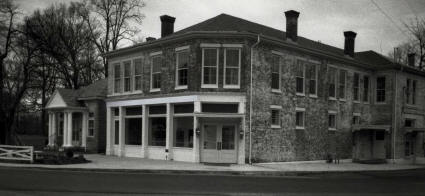
Constructed circa 1880, the Woodruff-Foley Brothers General Store (recent view above)
was located on the corner of Central and Railroad (now Mt. Mercy) Avenues.
Continuing straight down Central you’d next pass the Post Office,
the Presbyterian Church, the Gables, Edgewood & the Beeches.
Below, a 1905 view of the store when it also housed the Home Telephone Company.
From “A Place Called Pewee Valley,” prepared by the Pewee Valley Centennial Commission in 1970 to commemorate the Town’s 100th anniversary.
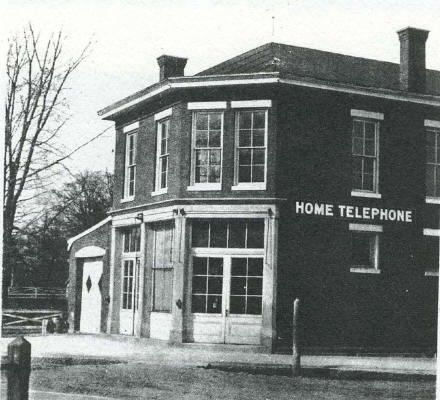
…about the time of The Little Colonel’s Christmas Vacation
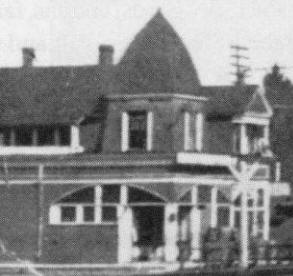
W. N. Jurey’s large wood-framed Queen Anne style building at what is now 300 Mt. Mercy Drive is thought to date from 1889, the year Jurey’s business card indicates the business was established. This building, which burned in 1912, was replaced with the present concrete-block store building (now the Little Colonel’s Playhouse) that same year.
Opposite corner of Central & Mt. Mercy from Woodruff-Foley Brothers General Store
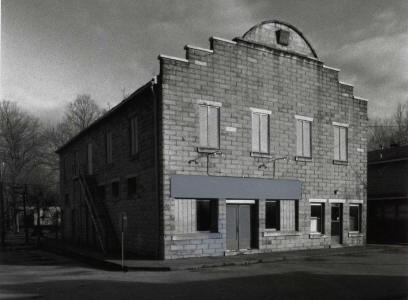
before it was rescued as The Little Colonel Playhouse.
This building would have been here when Mary Ware returned to her “Promised Land.”
page by Donna Russell